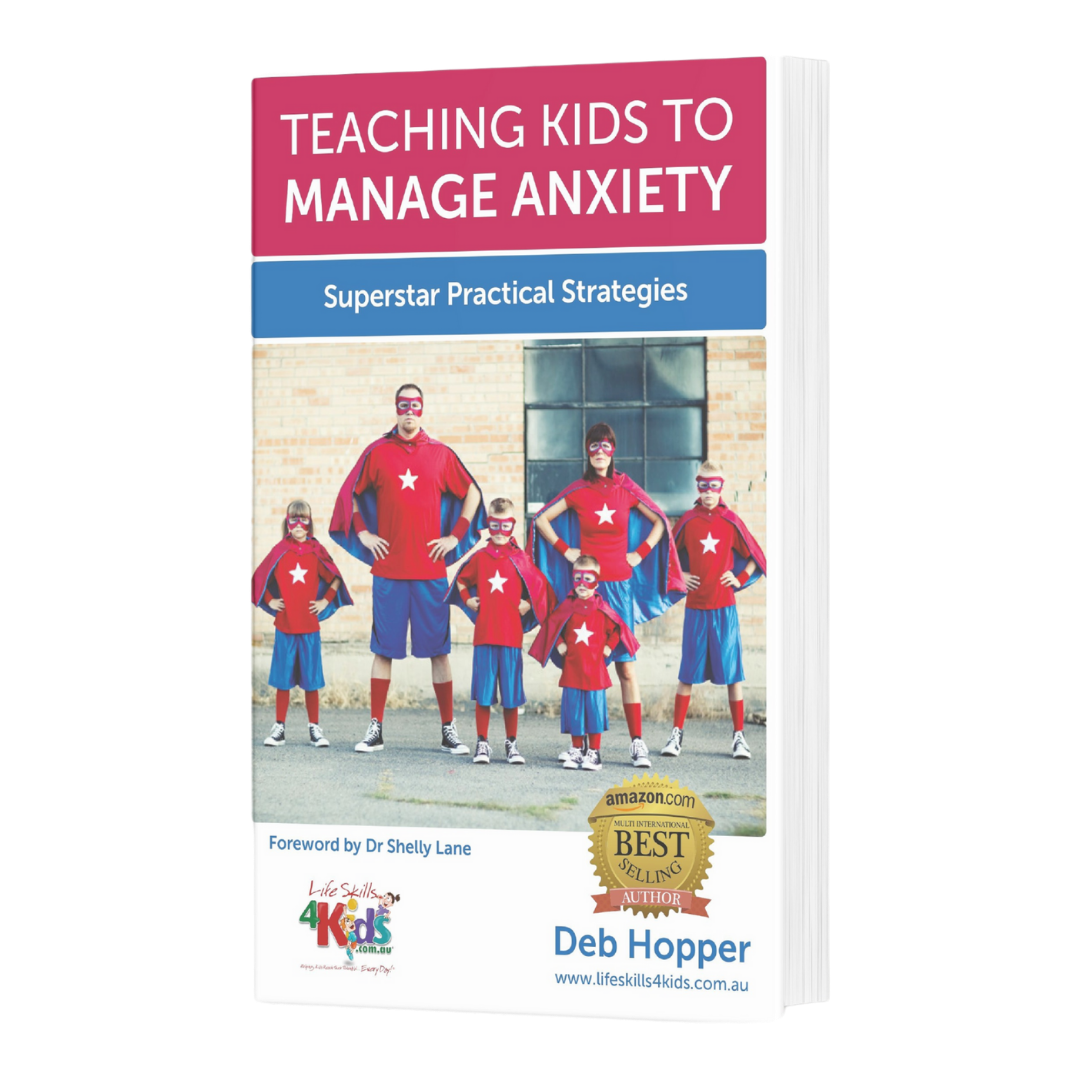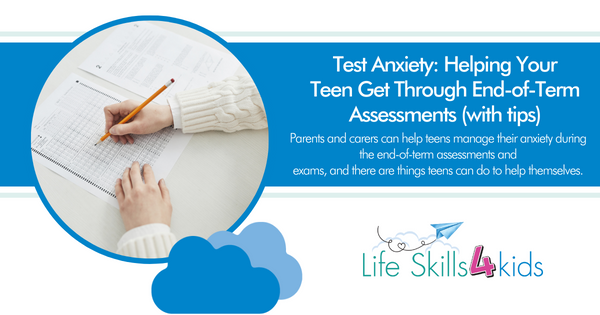Test anxiety is real. Just ask any student who’s looking forward to the end of the term with dread. As pressure mounts and the assessments pile up, many students are all too familiar with the feelings of anxiety that accompany them.
Even good students often feel anxious about their performance in tests and assessments, and while some of this pressure may be self-inflicted, we live in a world where great emphasis is placed on achievements and scores. It’s natural for students to feel pressure when faced with their own and others’ expectations of their performance.
Parents and carers can help teens manage their anxiety during the end-of-term assessments and exams, and there are things teens can do to help themselves.
Let’s take a look at some strategies for overcoming test anxiety, but first, a quick look at what it is.
What is test anxiety?
In its severe or even moderate forms, test anxiety causes a student such distress that they are unable to function normally and may struggle to complete the test at all. It certainly hinders their ability to do their best, and for some, it’s a major problem that compounds with each bad experience at testing time.
Experts agree that a small amount of test anxiety is healthy, as it motivates us to do our best, but beyond that, it can be debilitating. Severe test anxiety causes our brains to freeze and go into fight-or-flight (or survival) mode, switching off the areas of our brains we need for taking the test.
So, what can we do about it?
Strategies for teens
- Remember that a single test is not the defining moment of a lifetime. Life will go on whether or not you do well on the test, and it’s helpful to have the big picture in mind before the test.
- Accept that you are not perfect, nor is perfection required on a test. If you get a question wrong or mess it up somehow, give yourself some grace.
- Our brains function like a computer at times, with some of the “working memory” taken up by worries. To free up this extra brain capacity before a test, try writing about your feelings and “unload” on paper to clear your mind of worries before the test.
- Try relaxation exercises before the test. Lie down and focus on relaxing all your muscles, beginning at your feet and working your way up your body. Let your body relax until your limbs feel heavy. At the same time, take deep, slow breaths while you listen to calming music, imagine calming scenes in your mind, or use a guided relaxation exercise.
- Remind yourself about the purpose of the test. In most cases, t is simply to find out what you’re good at and what you need to practice. Putting it into perspective helps to make it less overwhelming.
- Put strategies in place ahead of time for what you will do if you don’t know the answer to a question, or if you have multiple choices and you don’t know which to choose. For example, you could guess the question you don’t know rather than leaving it blank, or you could eliminate the answers you know are wrong on a multiple-choice question.
- Don’t stay up late the night before the test. Get a good rest, avoid screen time right before bed, and eat a healthy breakfast.
- Start the day with a positive mindset. Listen to uplifting music, read something inspiring, get some exercise, or write down all the things you are grateful for. Imagine the best outcome possible and keep that thought in your mind if you start to become anxious.
- Avoid last-minute or late-night study. Give your brain the rest it needs to perform at its best during the test.
Tips for parents
- If you’re a parent, be encouraging and don’t place excess emphasis on the outcome of the test. Let your teen know that doing their best is more important than being the best.
- Help your child or teen prepare for a test by going through some practice tests with them
- Encourage your child or teen to verbalize any worries they have, then tackle them together For example, if your teen is worried about running out of time during the test, help them with a strategy to prioritize the most important questions, or use their watch to allocate a maximum amount of time to each question.
- Do some calming exercises together. This could include counting to ten while breathing deeply, visualizing a favourite calm place, doing a guided relaxation exercise, or a relaxing hand or foot massage.
- Acknowledge your teen’s feelings of worry, but encourage them to focus on positive outcomes instead of voicing negative thoughts. Remind your teen that they have worked hard to prepare and might do even better than they think.
Why over-preparing can make anxiety worse
While good preparation is the key to confidence before an exam, over-preparation can lead to greater anxiety as students try to prepare for every possible question in an exam. Much like overthinking, over-preparing can cause feelings of being overwhelmed and unready despite careful study and preparation.
At some point, a student needs to take control of the situation and know that they are as ready as possible for the test, then relax and let go of the compulsion to prepare. Stepping out of the anxiety-preparation-overthinking cycle is the best way to have a clear mind and stay relaxed enough to take the test and do their best.
You can keep anxiety under control
While it’s natural to be anxious at test time, anxiety doesn’t have to be in the driver’s seat. You can tackle it using these tips, or you can head over to my website, www.lifeskills4kids.com.au for more resources and handy tips.
Teaching Kids to Manage Anxiety
Kids today are growing up in a fast-paced world where information and opportunity overload can be overwhelming.
Based on many years of clinical experience as an Occupational Therapist, Deb Hopper has been using her Just Right Kids® Model to teach children to communicate and manage their stress and anxiety by:
- Identifying their “body speed”,
- Understanding their stress triggers, and
- Implementing simple strategies to reduce anxiety and stress.
“This is quite simply the best, most comprehensive and practical bookI have ever read to help teach children – and many grownups – how to manage anxiety. It is written in an easy to read way with lots of fabulous graphics. This brilliant book needs to be in every home, every school and every library.” — Parenting author and educator Maggie Dent
Explore
- How the body reacts to anxiety and impacts on our ability to think and get an action plan together
- How to teach your children to identify when their body and mind is anxious, and how to tell you
- Sensory overload and how this can push children into being anxious
- Strategies to reduce screen time that you can start today (because this will help reduce anxiety in your house and make life more peaceful


